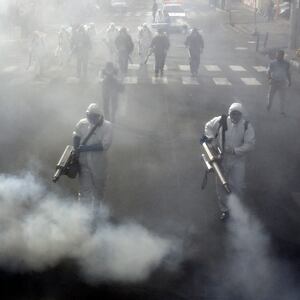The humanitarian banking channel set up by the Trump administration to get medicine and other supplies into Iran—a politically calculated show of compassion amid otherwise draconian U.S. sanctions—has not in fact processed any potentially life-saving transactions, the Swiss government confirmed to The Daily Beast.
Announced in late January and declared operational a month later, the channel, known as the Swiss Humanitarian Trade Arrangement (SHTA), was supposed to ensure that “humanitarian goods continue to reach the Iranian people without diversion by the regime,” as Treasury Secretary Steven Mnuchin said on Feb. 27.
But it’s not happening—at a time when, according to Johns Hopkins University, the novel coronavirus has infected an estimated 103,000 Iranians and killed at least 6,486.
“No transactions have yet been carried out. Unfortunately, this whole process has been slower than expected because of the COVID-19 pandemic,” said Fabian Maienfisch, a spokesman for Switzerland’s State Secretariat for Economic Affairs (SECO), which oversees the channel.
The moribund state of the channel contrasts with the fanfare with which the Trump administration announced it. To show that the “Maximum Pressure” sanctions campaign is not consigning Iranians to their fate during the pandemic, Secretary of State Mike Pompeo said on March 17, “We have an open humanitarian channel to facilitate legitimate transactions even while ensuring our maximum pressure campaign denies terrorists money.”
Knowledgeable observers say the way the channel is structured places substantial burdens in the way of companies looking to sell Iran humanitarian supplies.
Set up through the Swiss bank BCP, compliance requirements for making use of the channel are elevated by design, to provide the U.S. with an assurance that the money won’t be diverted into any Iranian military or other effort. The Treasury Department boasted in February of the “enhanced due diligence” participating financial institutions will need to perform.
“The reporting requirements are overkill. If it takes three months for a company to get the paperwork in order to even use the channel, it’s disingenuous for the administration to suggest it has done everything it can to ease humanitarian trade during a pandemic emergency,” said Esfandyar Batmanghelidj of Bourse & Bazaar, which tracks the Iranian economy.
Batmanghelidj and co-author Sahil Shah were the first to spot that the SHTA has not processed any transactions since a January pilot effort.
In an indication of the bureaucracy involved in the SHTA, Maienfisch told The Daily Beast, “Swiss export and trade companies that are interested in participating are currently collecting the necessary information and documents to be submitted to SECO.”
Queried by The Daily Beast, the Treasury Department declined comment beyond pointing to its Feb. 27 announcement that the SHTA channel is operational.
“It’s unfortunate that the Iranian government turned down our offer of humanitarian assistance for COVID-19. Our priority has been to stand with the Iranian people–and this offer is still on the table,” a State Department spokesperson said. “The United States and Switzerland remain committed to the success of the Swiss Humanitarian Trade Arrangement and we expect transactions to continue shortly. Iranian President Rouhani has also confirmed that U.S. sanctions have not impeded Iran’s response to COVID-19.”
At least one concern critics of “maximum pressure” had about the humanitarian-trade channel appears not to have manifested. It had been unclear from the SHTA’s establishment if Iran could transfer its foreign currency reserves held in other banks into BCP for the purchase of medical goods and food. Iranian foreign ministry spokesman Seyed Abbas Mousavi claimed in March that “we asked [the U.S.] to allow our other financial resources in various countries [to] enter this channel in order to provide medicines and medical equipment, but they [U.S.] did not allow it.”
Maienfisch clarified that Iran can put money it’s got outside BCP into the Swiss bank. “We are currently working on transfers to put additional funds into the SHTA with support from the U.S. side. There is nothing to clarify, as the need to regularly replenish the funds at BCP is understood and accepted by all parties involved,” he said.
Coronavirus hit Iran hard, as its ruling elites—like America’s—initially downplayed the severity of COVID-19 as little more than a common sickness.
Observers suspect the real number of Iran’s COVID-19 deaths is far higher than the Iranian government acknowledges. “In my experience, [the outbreak] was four to five times what was announced,” an anonymous doctor in Tehran told France24 on Wednesday, “but TV outlets insisted the numbers were low, so people weren’t taking it very seriously.” In late April, Iran began reopening its economy.
Maximum Pressure does not formally bar food, medicine or related goods from entering Iran. But Batmanghelidj said Iran continued to face weaknesses in its medical supply chain, something the SHTA was meant to alleviate.
“Launching the Swiss channel was an admission by the Trump administration that the ‘Maximum Pressure’ sanctions do in fact restrict humanitarian trade, thereby harming ordinary Iranians,” he said. “Failing to ensure the channel could actually operate while Iran confronted a global pandemic makes clear that some people in the administration just don’t care about the harm they are causing.”







